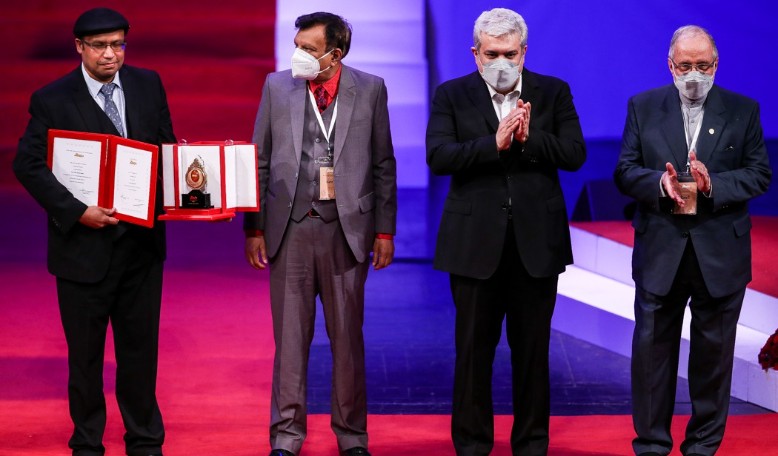Participants mull over 2021 Mustafa(Pbuh) Prize
Mustafa(Pbuh) Prize laureates, guests, and officials discussed the pros and cons of holding the 2021 Mustafa(Pbuh) Prize on Thursday morning at Parsian Azadi Hotel.
MSTF Media reports:
Iranian academic and diplomat Ali Akbar Salehi, head of the Mustafa
Prize policy-making council Sorena Sattari, Mustafa
Prize officials Hossein Naderimanesh and Mehdi Saffarinia attended the meeting held on October 21, 2021.
The 2021 Mustafa
Prize laureates Cumrun Vafa, M. Zahid Hasan, Yahya Tayalati, Mohamed El. Sayegh, and Muhammad Iqbal Choudhary also participated in the event.
During the event, Salehi introduced the Mustafa
Prize as an event set up in the past few years to recognize Muslim scientists and to pave the way for improving Islamic countries.
He said that Islam enjoyed the Golden Age, which coincides with the dark years of Europe. However, nowadays we are far from that golden era.
The Mustafa
Prize sheds light on the activities of Muslim scientists around the world, he said.
He pointed to the previous winners of the Mustafa
Prize saying that those who won the prize shined in the world afterward, which shows that the scientific committee does its work best.
Sourena Sattari also made a short speech about Mustafa
Prize. He said that the prize has built a new ecosystem, which connects universities, VCs, students, and tech parks to each other.
He said that Iran yearns for further cooperation with other countries in the field of science and technology.
After that, Naderimanesh as a member of the scientific committee of the Mustafa
Prize made a speech.
He called the meeting as brainstorming what was going on in the past days. He said that the Mustafa
Prize week is actually the gist of two years of activities.
Mustafa
Prize aims at creating a network amongst the scientists, he said.
“We should sell intensive science and knowledge instead of petroleum,” he concluded.
In the next part of the meeting, the Mustafa
Prize laureates made short talks about themselves, their achievement, and also about the Mustafa
Prize event.
Muhammad Iqbal Choudhary from Pakistan was the first speaker. He won the prize in the field of Bio-organic Chemistry for the “Discovery of fascinating molecules with therapeutic applications.”
He commented on the lack of investment in Muslim countries in science and technology in general. He said that for improvement there is a need for more investment in these fields.
He said that the Muslim countries should bring together all capacities for better outcome.
The mobility of Muslim scientists and scholars at least in the Islamic countries is one of the issues that is epitomized in the Mustafa
Prize, he concluded.
M. Zahid Hasan from Bangladesh was the next speaker. He won the Mustafa
Prize for his achievement in the Weyl fermion semimetals.
After introducing himself, he said that the scientists should connect their science with industry to improve their countries.
He described the status of matter in his study emphasizing fundamental science as an important part of knowledge, which is unfortunately ignored in Islamic countries.
Then Mohamed El. Sayegh from Lebanon made a short speech. He won the prize for his achievement in Novel Therapies to Improve Renal and Cardiac Allograft Outcomes.
He said that he has been conducting research on human health for years. However, he does his best to help people and students mentally and now is doing collaborative research projects.
Sayegh said that it was a great surprise for him to win the Mustafa
Prize and he is very happy with it.
Yahya Tayalati from Morocco was the next speaker. He won the prize for his Observation of the Light by Light Scattering and the Search for Magnetic Monopoles.
He said that he is working on exotic physics according to which, only 5 percent of the matters around us are recognizable and 95 percent are dark.
He said that the development of pure science affects everyday life.
In the third part of the event, guests and participants proposed their suggestions, appreciation, and comments on the holding of the Mustafa
Prize.
At the end of the meeting, Naderimanesh pointed out the expansion of joint cooperation in the form of science and technology networks, role-playing in formulating and explaining a clear strategy for the development of cooperation at the international level as some of the recommendations to enhance the Mustafa
Prize in the future.

